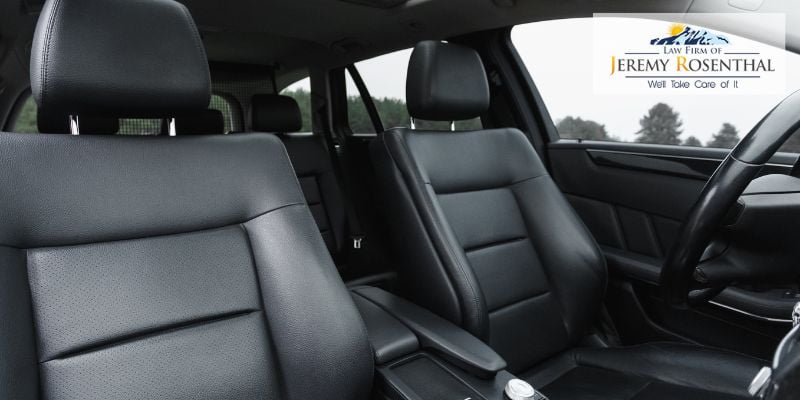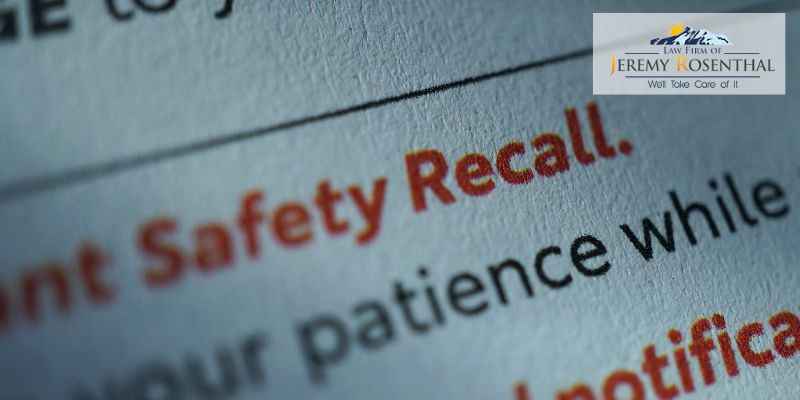If you or a loved one has been injured by a defective recline mechanism, you may be entitled to compensation from one of many liable parties. Car companies with knowledge of a mechanical problem with one of their vehicles may be held liable for injuries or even deaths that are caused by the issue. Dealerships or manufacturers may also be responsible under certain circumstances. Denver car accident lawyer, Jeremy Rosenthal fights for victims of car accidents to ensure that they are financially secure while they recover from their injuries. For a free case evaluation, contact our law firm today at (303) 825-2223 or online.

Recline Mechanisms
When considering the many different mechanisms present in a modern vehicle which could cause harm or injury to a driver or passenger, the seat recline mechanism would probably not come to mind. Often, malfunctioning brakes, transmissions, accelerators, or airbags are seen to be more dangerous than what is considered to be a simple comfort device. However, the recline mechanism of a vehicle’s seat has an important function for the safety of the driver and their passengers. It allows people of different heights and weights to access all safety functions in the car, see out of the windows and into all mirrors, and handle the steering wheel correctly.
Recline mechanisms in cars come in many different shapes and forms. While most are mechanical, more and more parts in vehicles are becoming electronic to provide enhanced comfort and convenience. Regardless of the mechanism’s construction, however, its primary function must be solid and well built to avoid the potentially disastrous consequences of breaking.
Dangers of Defective Recline Mechanisms
There are two potentially fatal situations involving the failure of recline mechanisms. Sometimes, recline mechanisms can fail spontaneously while a car is in motion, causing the driving to suddenly jolt backward. In this position, the driver is unable to see out the windows or successfully navigate the road. In certain circumstances, such as in a parking lot, the driver may be able to prevent an accident by stopping quickly, but imagine that the seat reclines without warning on the interstate. The results of this scenario can be fatal.
Alternatively, seat mechanisms tend to fail during car accidents. The jolt from a high impact collision can cause the mechanism to unlock, forcing the driver into a reclined position which can prevent the airbags from doing their job in the event of an accident. This can greatly exacerbate injuries sustained in the collision and may even contribute to the death of the driver and/or passenger.
These dangerous situations are generally due to defective design, cheap or ineffectual materials, poor manufacturing, or a combination of the preceding flaws. Carmakers have a duty to their customers to provide safe and functioning parts in their vehicles and, when they do not, they should be held responsible for their failure. If a manufacturer has knowledge that there may be a technical issue with their vehicle, they have a duty to issue a recall and repair the vehicle in question to protect people on the road.
Recalls for Defective Recline Mechanisms
Evidence of this vehicle defect is present in the number of recalls that have been issued by car companies which have produced models with faulty recline mechanisms. For example, the major car company Ford recalled nearly 400,000 units of their 2001-2004 Ford Escapes to repair an issue with a part that had commonly begun to corrode. The company was receiving reports of excessive corrosion and rust on the forward attachment of the lower control arm which could eventually lead to the arm completely falling off of the seat. In this instance, the driver would likely lose control of the steering.
In a smaller, simultaneous recall from Ford, a problem with the weld joints between the seat back recliner and the seat frame caused the seat to lean back or even break under duress. This defect did not meet a Federal Motor Vehicle Safety Standard and was found to increase the chance of serious injury in the event of an accident.

In 2013, a recall involving vehicles produced by General Motors was issued for a related issue. In this case, 2014 Chevrolet Silverados with manual reclining seatbacks were recalled when they failed to conform to safety standards for head rests. In this case, it was found that the seat back was unstable. If “the vehicle is struck from behind, the head restraint may not meet the dynamic performance requirements, which could increase the risk of injury.” Dealership mechanics were trained in how to repair the defect and the seat recliner mechanisms were inspected and repaired on a case by case basis.
Earlier, in the nineties, Saturn recalled 1,210 vehicles to repair reclining mechanisms on the two front seats after receiving 19 customer complaints about the problem. If the driver or passenger leaned back in the front seats, the seat backs could slip back a notch or two without warning. This event could occur while the car was in motion, creating a hazard for drivers and their passengers. In this case, the company found that the “defect was caused when the supplier changed a manufacturing process for a part used in the seat back.”
Addressing Vehicle Defects in Colorado
It is important to note that, even though some car manufacturers will issue a recall for such problems, others may choose to ignore a few customer complaints in order to avoid the cost of having to repair a number of defective vehicles. They may believe that settling a few personal injury or wrongful death claims stemming from accidents related to the defect is less expensive than going through the hassle of obtaining new parts, training dealership mechanics on how to fix the part, and providing complimentary labor to their customers. However, when car companies choose not to disclose information about potentially hazardous defects in their vehicles, they are knowingly putting their customers at risk.
If you or a loved one has been injured by a defective recline mechanism, you may be entitled to compensation from one of many liable parties. Car companies with knowledge of a mechanical problem with one of their vehicles may be held liable for injuries or even deaths that are caused by the issue. Dealerships or manufacturers may also be responsible under certain circumstances. Jeremy Rosenthal fights for victims of car accidents to ensure that they are financially secure while they recover from their injuries. For a free case evaluation, contact our law firm today at (303) 825-2223 or online.
